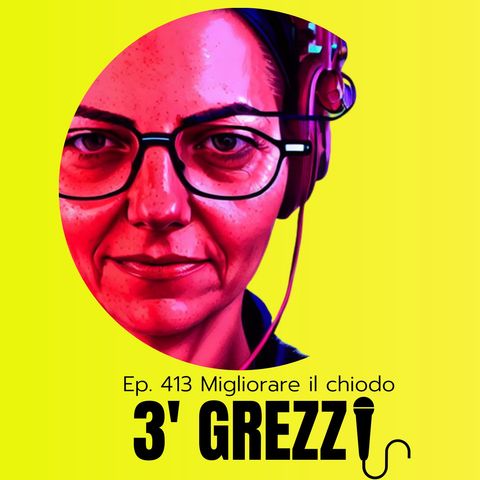3' grezzi Ep. 413 Migliorare il chiodo

Sign up for free
Listen to this episode and many more. Enjoy the best podcasts on Spreaker!
Download and listen anywhere
Download your favorite episodes and enjoy them, wherever you are! Sign up or log in now to access offline listening.
3' grezzi Ep. 413 Migliorare il chiodo
Description
Tutti parlano di innovazione, ma arrivati a un certo punto è impossibile continuare ad innovare. Prendete l'umilissimo chiodo. TRASCRIZIONE [ENG translation below] Oggi ho rincontrato un termine interessante che avevo...
show moreTRASCRIZIONE [ENG translation below]
Oggi ho rincontrato un termine interessante che avevo visto un po' di tempo fa, poi lo avevo perso di vista e l'ho rincontrato nell'interessantissima newsletter che ricevo ogni tanto, di Jacopo Perfetti. Il termine è exnovation.
Per avere una definizione sono andata su Wikipedia e ho scoperto una cosa interessante, che questo termine ha una sua pagina su Wikipedia, in inglese e in altre tre lingue, non c'è in italiano, c'è in tedesco, ok, c'è in macedone, va bene, e c'è pure in latino, quindi non c'è in italiano, ma c'è in latino e se siete curiosi di sapere come si dice, exnovation in latino si dice 'enovatio' ed è il 'contrarium' di 'innovationis'.
Cos'è questa exnovation di cui non abbiamo una parola ancora in italiano? È una parola che è stata creata alla fine degli anni '70 per indicare quel processo per cui si arriva a sostituire vecchie tecnologie con tecnologie nuove che, si spera, funzionino meglio.
Poi, negli anni '80 questa parola è stata utilizzata anche per indicare la sostituzione di pratiche amministrative obsolete con pratiche più snelle, e anche questa è una cosa molto auspicabile.
Adesso il termine exnovation, invece, viene utilizzato proprio come contrario di innovazione, cioè quando qualcosa ha raggiunto la sua espressione massima, migliore, ottimale e quindi non c'è più bisogno di aggiungere niente.
Un esempio che mi viene in mente è il chiodo. Avete presente il chiodo, quello che usiamo per appendere i quadri bum bum alla parete? Pensate che il chiodo è così da boh, migliaia e migliaia di anni. Cioè la persona che si è inventata il chiodo, così come lo usiamo oggi, ha già fatto una cosa perfetta, perché effettivamente è difficile migliorare il chiodo. Qualsiasi cosa si voglia fare non si fa altro che appesantire l'oggetto che invece è così perfetto già come è.
Stessa cosa con gli spilli. Gli spilli non so chi li abbia inventati, che però a pensarci mi sembrano una versione minuscola, una mini versione del chiodo, anche perché hanno la stessa forma, anche gli spilli, gli hanno messo la capocchia con la sfera, con la pallina però altrimenti non sono stati modificati.
Un altro esempio che questo viene fatto nella newsletter di Jacopo Perfetti è la band rock AC/DC e dice, mentre tutti gli altri col tempo cercano di reinventarsi eccetera, gli AC/DC sono rimasti uguali a loro stessi da decenni e sono una delle band più di successo del mondo del rock che vende un sacco ancora.
Quindi non sempre occorre reinventare la ruota. A volte chiediamoci ma questa innovazione veramente è indispensabile?
LINKS
Newsletter di Jacopo Perfetti https://corrente.email/issues/64/
Wikipedia in latino https://la.wikipedia.org/wiki/Enovatio
TRANSLATION
Today I met again an interesting term that I had seen some time ago, then I had lost sight of and I met again in the very interesting newsletter I receive from time to time, from Jacopo Perfetti. The term is exnovation.
To get a definition I went to Wikipedia and I discovered an interesting thing, that this term has its own page on Wikipedia, in English and in three other languages, not in Italian, in German, ok, in Macedonian, all right, and also in Latin, so not in Italian but in Latin! And if you're curious to know how to say exnovation in Latin, it is 'enovatio' and it's the 'contrarium' of 'innovationis'.
What is this exnovation of which we still don't have a word in Italian? It's a word that was created in the late '70s to indicate the process whereby old technologies are replaced with new ones that hopefully work better.
Then, in the 80s this word was also used to indicate the replacement of obsolete administrative practices with more streamlined ones, and this is also a very desirable thing.
Now the term exnovation is actually used precisely as the opposite of innovation, that is, when something has reached its maximum, best, optimal expression and therefore there is no longer any need to improve it.
An example that comes to mind is the nail. Do you know the nail, the one we use to hang boom boom paintings on the wall? Think that the nail has been like this for thousands and thousands of years. That is, the person who invented the nail, as we use it today, has already done a perfect thing, because it is actually difficult to improve the nail.
Whatever you want to do, you do nothing but weigh down the object which is already perfect as it is. Same thing with pins. I don't know who invented the pins, but thinking about it, they seem like a tiny version, a mini version of the nail, also because they have the same shape, even the pins, they put the head with the sphere, with the tiny ball, but otherwise they have not changed.
Another example that this is done in Jacopo Perfetti's newsletter is the rock band AC/DC and he says, while all the others over time try to reinvent themselves etc., AC/DC have remained the same for decades and are one of the world's most successful rock bands, still sells a lot.
So you don't always have to reinvent the wheel. Sometimes we should ask ourselves, is this innovation really essential?
Information
| Author | M. Cristina Marras |
| Organization | M. Cristina Marras |
| Website | - |
| Tags |
Copyright 2024 - Spreaker Inc. an iHeartMedia Company
